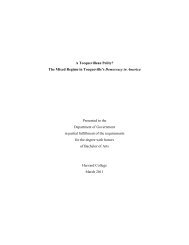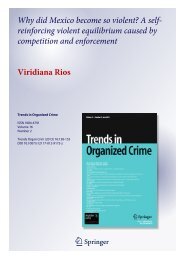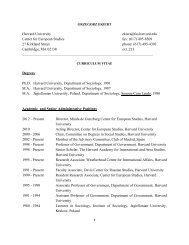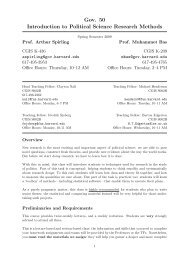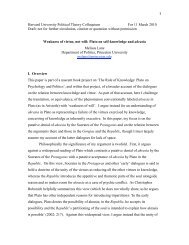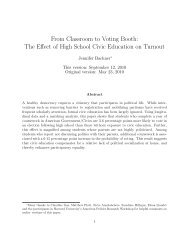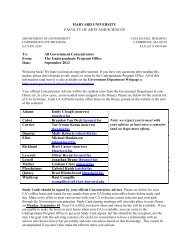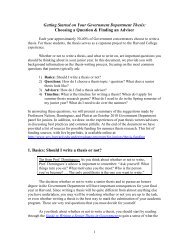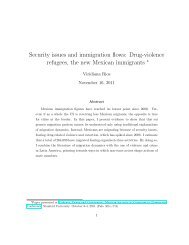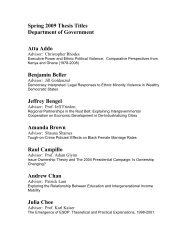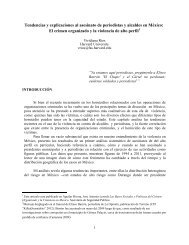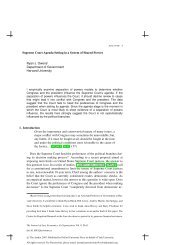Why are Mexican mayors getting killed by traffickers? The dynamics ...
Why are Mexican mayors getting killed by traffickers? The dynamics ...
Why are Mexican mayors getting killed by traffickers? The dynamics ...
Create successful ePaper yourself
Turn your PDF publications into a flip-book with our unique Google optimized e-Paper software.
Current academic literature understands the relationship between criminals and government<br />
as an evolutionary phenomenon. Criminals have as one of their main interests to control the<br />
state in order to facilitate the conduction of their illegal business. Yet, in its first stages, when<br />
crime is less pervasive, profitable and organized, controlling the state is impossible for DTOs.<br />
It is only when DTOs “evolve” and become more powerful, that they <strong>are</strong> able to impose their<br />
will into a relatively weaker state (Baylor and Godson 2001, pg 14-15). At the peak of their<br />
evolution, criminal organizations become parallel states (Bunker and Sullivan 2010) and supply<br />
services –such as protection– that the state is not able to provide. In short, literature argues<br />
that <strong>traffickers</strong> demand corruption only when they <strong>are</strong> not powerful enough as to become the<br />
government themselves.<br />
This understanding of the political/criminal nexus however has failed to take in consideration<br />
many other reasons why, I argue, even a highly powerful DTO may prefer to have a state<br />
(rather than being the state themselves). A state benefits <strong>traffickers</strong> as it ensures larger and<br />
cheaper trade.<br />
A legitimate state is useful for <strong>traffickers</strong> as it (a) provides a platform of legal trade that<br />
is used <strong>by</strong> <strong>traffickers</strong> to smuggle their products, and (b) a series of public goods and positive<br />
externalities, such as a structure of law enforcement and infrastructure that <strong>traffickers</strong> can use<br />
for their own advantage. A state is required for the survival of any type of business, illegal ones<br />
included. Ironically, even criminals need politicians.<br />
First, having a legitimate state secures an stable amount of commercial transactions and<br />
trade. Legal trade facilitates illegal trade because a large sh<strong>are</strong> of illegal products cross borders<br />
camouflaged as legal cargo. Actually, increments in US-Mexico trade during the late nineties<br />
as a result of the North American Free Trade Agreement (NAFTA) proved to be a blessing<br />
for <strong>Mexican</strong> DTOs. If Mexico became the main illegal-drug exporter into the US is precisely<br />
because the country became an increasingly important commercial partner for the US 2 . Drug<br />
lords love trade, and traders love governments. <strong>The</strong> circle is closed.<br />
Furthermore, as trade increases, the burden of inspection increases exponentially. About 40<br />
percent of all trade between Mexico and the US crosses via Nuevo L<strong>are</strong>do, a small city at the<br />
border of Texas (INEGI 2005), that is thousands of trucks per day. <strong>Mexican</strong> migration officers<br />
2 During the nineties, <strong>Mexican</strong> DTOs were well aw<strong>are</strong> of the value that Mexico would acquire if NAFTA was<br />
signed. <strong>The</strong>y saw the trade bonanza approaching. As soon as the trade agreement was signed in 1994, some of<br />
them hired migration experts to advice them on which were the best type of cargo for introducing their products<br />
into the US (Blancornelas 2001). Advisors were necessary because for health and other considerations, some<br />
cargos were going to be (and currently <strong>are</strong>) inspected less c<strong>are</strong>fully than others (e.g. perishable goods cross the<br />
border faster than say, electronics). Knowing the probability of inspection in advance was a de facto reduction<br />
in transportation costs for DTOs.<br />
4



